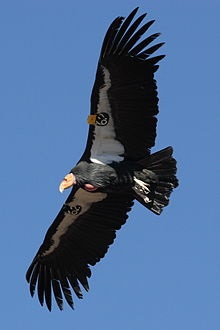|
|
| |
|
|
| |
|
|
|
|
| |
 |
| A California condor
marked with wing tags. |
Ornithology
Ornithology is a branch of zoology that concerns the
"methodological study and consequent knowledge of birds
with all that relates to them". Several aspects of
ornithology differ from related disciplines, due partly
to the high visibility and the aesthetic appeal of
birds. It has also been an area with a large
contribution made by amateurs in terms of time,
resources, and financial support. Studies on birds have
helped develop key concepts in biology including
evolution, behaviour and ecology such as the definition
of species, the process of speciation, instinct,
learning, ecological niches, guilds, island
biogeography, phylogeography, and conservation.
While early ornithology was principally concerned with
descriptions and distributions of species,
ornithologists today seek answers to very specific
questions, often using birds as models to test
hypotheses or predictions based on theories. Most modern
biological theories apply across life forms, and the
number of scientists who identify themselves as
"ornithologists" has therefore declined. A wide range of
tools and techniques are used in ornithology, both
inside the laboratory and out in the field, and
innovations are constantly made. |
|
|
The science of ornithology has a long history and
studies on birds have helped develop several key
concepts in evolution, behaviour and ecology such as the
definition of species, the process of speciation,
instinct, learning, ecological niches, guilds, island
biogeography, phylogeography, and conservation. |
|
|
Most modern biological theories apply across taxonomic
groups, and the number of professional scientists who
identify themselves as "ornithologists" has therefore
declined. A wide range of tools and techniques is used
in ornithology, both inside the laboratory and out in
the field, and innovations are constantly made. |
|
|
|
|
|
|
|
|
|
|
|
|
|
|
|
|
|
|
Search Fun Easy English |
|
|
|
|
|
|
|
|
|
|
|
|
|
|
|
About
Contact
Copyright
Resources
Site Map |